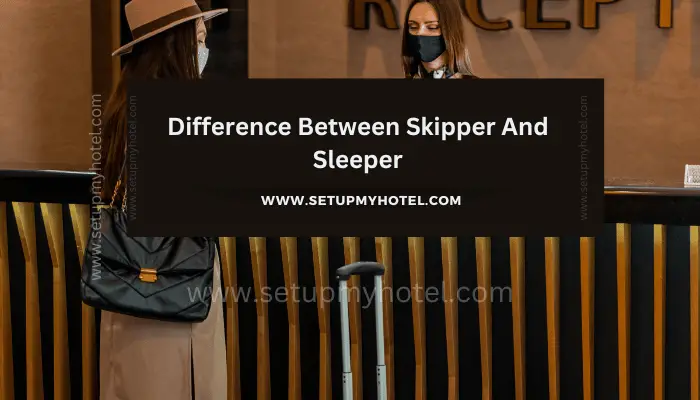Difference Between Skipper and Sleeper in the Hotel Industry
Introduction: Decoding SkipperA guest who leaves with no intention of paying for the room. and SleeperSleeper: The guest has settled his or her account and left the hotel; but the front office staff has... in HotelA Hotel or Inn may be defined as an establishment whose primary business is providing lodging facili... Operations
In the realm of hotel operations, the terms “Skipper” and “Sleeper” carry unique significance, representing distinct challenges that demand attention and strategic solutions.
In the intricate world of hotel management, precise room status updates are vital for a seamless guest experience. Two terms that play a crucial role in understanding the dynamics of this process are “Skipper” and “Sleeper.”
Each term reflects a distinct scenario that can pose challenges for hotel staff. In this discussion, we explore the definitions, implications, and preventive measures associated with these terms, shedding light on the intricacies of managing guest accounts and room statuses.
Definition Of The Term Skipper
A room status term indicating that the guest has left the hotel without making arrangements to settle his or her account. The room is vacant but believed to be occupied.
SkipSkip is when the room is vacant but the bill is not settled. is the term used to refer to a hotel guest who vacates a guest room without paying the bill incurred for room charges and extras.
A housekeeping discrepancy report indicates that a room is vacant, but the front office status shows it is occupied then the cashier or GSA should search for an active room folio and registration card.
Accidentals – These are guests who simply forget to pay, often their extra bills.
Opportunists – These guests check-in to pay their bill on departure, but when they realize that they can get away without paying their bill or part of the bill.
Premeditators – These are guests who, from the start, have the intention of leaving the hotel without paying.
Skippers often come with little luggage or no luggage. The bell boys have to be alerted to notify the front office about guests with scanty baggage to take necessary advance from them at the time of check-out.
How to Prevent Skippers?
- Make sure you always ask guests to fill in registration cards with all details upon check-in.
- Preauthorize guest’s credit cards including deposit of a set amount.
- On PMS activate a NO post on the reservation to stop any extra charges from other outlets to be charged to the guest room.
Definition Of Sleeper
Room status term indicating that the guest has settled his or her account and left the hotel, but the front office staff has failed to properly update the room’s status.
The room is vacant but believed to be occupied.
Sleep-Out A room status term indicating that the guest is registered to the room, but the bed has not been used.
A housekeeping discrepancy report indicates that a room is vacant, but the front office status shows it is occupied then the cashier or GSA should search for an active room folio and registration card.
How to Prevent Sleepers?
Show Checkout on the Front officeFront office is the communication; accounting; and service center of the hotel software and balance all guest folio without fail after guest checkout.
Skipper, denoting a guest who leaves the hotel without settling their account, creates a room status conundrum – a vacant room believed to be occupied. Guests may fall into categories such as Accidentals, Opportunists, or Premeditators. Identifying potential skippers, often with minimal luggage, requires proactive measures. To prevent skipping incidents, meticulous guest registration, credit card preauthorization, and activating a NO post on the reservation are recommended.
On the flip side, Sleeper signifies a situation where a guest settles their account but the front office fails to update the room status, resulting in a vacant room erroneously marked as occupied. The introduction of “Sleep-Out” adds complexity, indicating a registered room with an unused bed. Prevention involves ensuring timely and accurate checkout updates on front office software and balancing guest folios promptly.
Understanding the distinctions between Skipper and Sleeper scenarios is critical for hotel staff. Proactive measures, from thorough guest registration to vigilant financial processes, serve as the bedrock for minimizing these challenges and maintaining operational excellence in the dynamic hospitality landscape.










